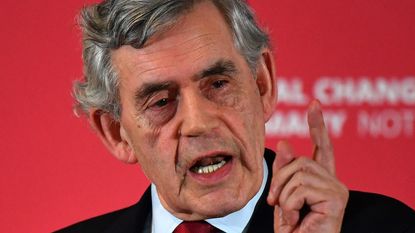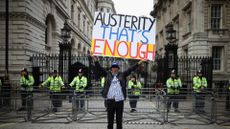Is it time to nationalise energy companies?
Gordon Brown calls for government to negotiate with energy providers for lower prices

Energy firms that cannot lower bills should be temporarily brought into public ownership, former Labour prime minister Gordon Brown has said, in a “stark challenge” to the government.
Writing for The Guardian, Brown has called for the energy price cap to be cancelled and for the government to negotiate new lower prices with energy companies. The former Labour prime minister compared the current cost-of-living crisis to 2008, when some banks were temporarily nationalised to protect consumers.
Writing after annual bills were forecast to reach more than £4,200 by January, Brown said that the government should “pause any further increase in the cap” and then negotiate separate company agreements to keep prices down after examining profit margins and available social tariffs.
Subscribe to The Week
Escape your echo chamber. Get the facts behind the news, plus analysis from multiple perspectives.

Sign up for The Week's Free Newsletters
From our morning news briefing to a weekly Good News Newsletter, get the best of The Week delivered directly to your inbox.
From our morning news briefing to a weekly Good News Newsletter, get the best of The Week delivered directly to your inbox.
Any companies who could not agree to such a requirement should be brought into temporary public ownership, said Brown.
What did the papers say?
More than 100,000 people have already put their names to a petition calling for the nationalisation of the UK’s energy assets, suggesting it is an idea gaining credence with the public.
The Trades Union Congress (TUC) has also proposed a “pragmatic reshaping” of the UK’s energy market. It has called for it to be “more in line” with some European countries, which it says are “finding it easier” to weather the energy crisis. The union is urging the government to take the “Big Five” energy suppliers and other failing retailers into public ownership. It says the cost of doing so – under £2.5bn – is similar to what the government has already spent on bailing out insolvent energy company Bulb.
Both the collapse of Bulb and rising gas prices “begs the question” of nationalisation, said an anonymous former Bulb employee on the i news site. “Billions of pounds” have been funnelled back to private shareholders since the privatisation of the energy sector in the 1990s, and since then the price people pay for their energy has continued to increase “despite the argument that a privatised energy sector would be more efficient and therefore cheaper”.
But the decisions made by the government last week to pay for Bulb’s continued operations via a special administrator “shows how straightforward nationalisation could be”.
But while the TUC is right that “governments have a duty to ensure we have access to cheap, reliable electricity, like other public goods”, wrote Sunny Hundal in The Independent, the answer “doesn’t lie in the government running energy companies” because it doesn’t account for “how the industry is changing”. A better option is to “decentralise” the energy market and “allow anyone and everyone to put up solar panels or wind farms to generate their own electricity”, argued Hundal.
The government is now under pressure to introduce more state action, such as full energy price controls, greater windfall taxes and the “destructive” renationalisation of the gas and electricity sector, as in France, wrote Allister Heath in The Daily Telegraph. “We have a Tory government, but the political climate is veering hard-Left as a result of years of failure to push an alternative agenda,” he said.
If Liz Truss becomes prime minister, she will need a “short-term strategy to survive the cost-of-living crisis” while launching “a blitz of truly radical, pro-growth reforms and bolstering the supply of energy”.
What next?
As thousands pledge to cancel their direct debits as part of the Don’t Pay UK movement, Conservative leadership contender Rishi Sunak has promised “hundreds of pounds more” to the most vulnerable households if he becomes prime minister. Frontrunner Truss has refused to commit further direct payments to struggling households.
Outgoing prime minister Boris Johnson has also rejected calls for an emergency Cobra meeting to address the cost-of-living crisis, with his office saying it would be for Truss or Sunak to work out a plan once the leadership race is over in September.
Create an account with the same email registered to your subscription to unlock access.
Sign up for Today's Best Articles in your inbox
A free daily email with the biggest news stories of the day – and the best features from TheWeek.com
Sorcha Bradley is a writer at The Week and a regular on “The Week Unwrapped” podcast. She worked at The Week magazine for a year and a half before taking up her current role with the digital team, where she mostly covers UK current affairs and politics. Before joining The Week, Sorcha worked at slow-news start-up Tortoise Media. She has also written for Sky News, The Sunday Times, the London Evening Standard and Grazia magazine, among other publications. She has a master’s in newspaper journalism from City, University of London, where she specialised in political journalism.
-
 Who actually needs life insurance?
Who actually needs life insurance?The Explainer If you have kids or are worried about passing on debt, the added security may be worth it
By Becca Stanek, The Week US Published
-
 Sexual wellness trends to know, from products and therapies to retreats and hotels
Sexual wellness trends to know, from products and therapies to retreats and hotelsThe Week Recommends Talking about pleasure and sexual health is becoming less taboo
By Theara Coleman, The Week US Published
-
 Is the AI bubble deflating?
Is the AI bubble deflating?Today's Big Question Growing skepticism and high costs prompt reconsideration
By Joel Mathis, The Week US Published
-
 Why are dollar stores a microcosm for America's shrinkflation problem?
Why are dollar stores a microcosm for America's shrinkflation problem?Today's Big Question Recent reports have tapped dollar stores as the top offenders of shrinkflation — even beyond grocery stores
By Justin Klawans, The Week US Published
-
 New austerity: can public services take any more cuts?
New austerity: can public services take any more cuts?Today's Big Question Some government departments already 'in last chance saloon', say unions, as Conservative tax-cutting plans 'hang in the balance'
By The Week UK Published
-
 Has life in Russia regressed since the Ukraine invasion?
Has life in Russia regressed since the Ukraine invasion?Today's big question The 'war economy' has defied Western sanctions as ordinary citizens rally round the regime
By Elliott Goat, The Week UK Published
-
 Can DEI survive an anti-woke backlash?
Can DEI survive an anti-woke backlash?Today's Big Question Activists take aim at corporate diversity programs
By Joel Mathis, The Week US Published
-
 How did America avoid a recession in 2023?
How did America avoid a recession in 2023?Today's Big Question A downturn was inevitable. Until it wasn't.
By Joel Mathis, The Week US Published
-
 Will the UK economy bounce back in 2024?
Will the UK economy bounce back in 2024?Today's Big Question Fears of recession follow warning that the West is 'sleepwalking into economic catastrophe'
By Chas Newkey-Burden, The Week UK Published
-
 What does a slowdown in payroll additions mean for the coming year?
What does a slowdown in payroll additions mean for the coming year?Today's Big Question New private payrolls were well below expectations this November, according to one report
By Justin Klawans, The Week US Published
-
 Would tax cuts benefit the UK economy?
Would tax cuts benefit the UK economy?Today's Big Question More money in people's pockets may help the Tories politically, but could harm efforts to keep inflation falling
By The Week UK Published